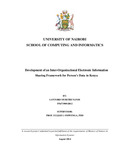| dc.description.abstract | Interoperability of person’s data in institutions dealing with registrations of persons who are
primary stashers of person’s data is of paramount importance for Kenya to have an accurate
person’s data that can be considered as a single source of truth. The purpose of this research
project was therefore to interrogate the interoperability and data sharing issues in relation to
person’s data information with an aim of developing a framework that forms a basis for
person’s data interoperability improvements. The factors affecting person’s data
interoperability were categorised into three areas. This included i) technical interoperability
which evaluated security, databases and proprietary biometric systems, data heterogeneity and
legacy system; ii) Organisational interoperability which considered stakeholder involvement,
data ownership, bureaucracy and business process reengineering and lastly; iii) peripheral
interoperability that was composed of economic, legal and policy as well as political and
donor impacts.
The research was conducted in selected institutions either dealing with person’s registration or
directly involved in management of processing of persons data. The research targeted officers
from Civil Registration Department (CRD), National Registration Bureau, Integrated
Population Registration Department and ICT officers across the Ministries.
Results of the survey clearly show the need for person’s data interoperability. The results
assert the need for ICT use in order to achieve interoperability that would lead to accuracy of
person’s data in Kenya as well as elimination of duplications in registration process. The
results identified the top most key issues that have to be addressed to achieve interoperability
in person’s data in order of priority as data security, data heterogeneity, elimination of
bureaucracy, enabling legislation policy and strategies, data ownership. The results of the
survey further identifies data ownership, bureaucracy, and business process reengineering and
stakeholder involvement as being closely related in respect to person’s data interoperability.
The research proposes a deliberate effort by the government to address person’s data
interoperability in Kenya during formulation of policies, master plans and strategic documents
for the specific person’s data interoperability to be achieved. | en_US |

